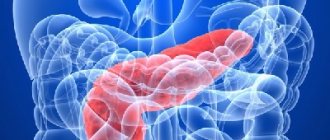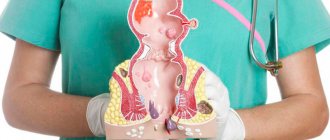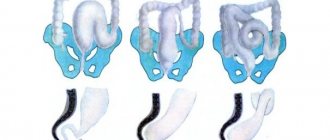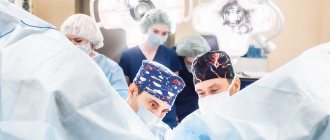Intestinal problems have become increasingly common lately. Many people try to cope with them on their own, but often a situation arises when they cannot do without the help of a specialist. Having suffered from pain and flatulence, a person wonders which doctor to see. The condition of the intestines is very important for the health of the entire body, because it not only absorbs nutrients, but also produces hormones, enzymes, vitamins, and develops immunity. Therefore, if problems arise, you need to start treatment as soon as possible.
Symptoms
A gastroenterologist treats all diseases. The main signs for contacting him are:
- pain in the abdominal area, most often located in a certain place,
- constant bloating and flatulence,
- burning in the esophagus or heartburn,
- hiccups and belching,
- bad breath,
- taste of bitterness, sourness, metal in the mouth,
- vomiting and nausea,
- diarrhea and constipation,
- skin problems: for example, inflammation due to problems with the gastrointestinal tract.
general information
Constipation (constipation) is not an independent disease.
The problem is characteristic of intestinal dysfunction, which results in the inability to adequately clear it from feces. The child's bowel movements become less frequent (usually less than once every 2 days) or stop completely. Constipation occurs quite often in children, especially at the stage when the child is just starting to go to kindergarten (psychological etiology of constipation). It is important to recognize it early and begin appropriate treatment.
The most common gastrointestinal problems
People often ask the question: what diseases does a gastroenterologist treat? Below we highlight the most common:
- Gastritis, ulcerative lesions of the duodenum, small and large intestine.
- Irritable bowel syndrome, Crohn's disease.
- Biliary dyskinesia.
- Refluxes and esophagitis.
Now you know who a gastroenterologist is and what he treats . Often he has to identify and treat diseases of the liver or bile ducts. It also happens that the gastroenterologist refers to other doctors. The digestive system consists of a huge number of organs, which is why highly specialized doctors deal with certain diseases:
- Proctologist - identifies and treats diseases of the colon.
- Hepatologist is a doctor who specializes in liver diseases.
If the gastroenterologist cannot find the cause of the symptoms, or he is sure that the cause is not in the gastrointestinal tract, then he will refer the patient to a general practitioner.
Have questions?
You can get detailed information about services and prices and make an appointment by phone. Information about the location of our clinic and directions can be found in the Contacts section.
Palpation
Palpation is an examination method.
The next point of examination is palpation of the anus, i.e. probing with fingers. Rest assured, it is not curiosity that pushes the doctor to this unpleasant action.
Palpation allows the doctor to determine the condition of the anus muscles, detect hemorrhoids, fissures, and possible tumors located in front of the anus.
In addition, in parallel in men, it is possible to diagnose the condition of the prostate gland. In women, it is possible to determine the condition of the appendages and the uterus itself. By palpation, it is possible to detect compactions in the intestinal walls, purulent tissue inflammation, intestinal ulcers, and scars.
Such an examination is definitely very productive for both women and men. It allows the doctor to decide on the direction of subsequent diagnosis or establish a final diagnosis and proceed to treatment of the disease. The doctor must carry out this examination exclusively with gloves.
Immediately before the examination, to reduce friction and less pain, the doctor should apply a lubricant to his hands. This could be Vaseline, antiseptic gel or any other ointment.
Appointment with a gastroenterologist
Many people are interested in how a specialist gastroenterologist conducts an appointment , what he does, what he researches. In reality, there is nothing wrong with the initial reception. Let's take a closer look at the actions that the gastroenterologist will perform:
- Collect anamnesis. The doctor does a detailed questioning and listens to his complaints. It is necessary to talk about all diseases, even those not related to the digestive system. He will ask questions about lifestyle and quality of life, nutrition and diet. If you have the results of any studies or past hospital discharges, you need to show them to the doctor, and he himself will decide what he needs.
- Examine based on palpation. The doctor examines the patient, palpates the abdominal cavity, paying attention to problem areas.
Based on the survey and examination, the doctor makes recommendations on therapy, lifestyle, prescribes tests and refers for additional examinations. The following actions can be performed as further examinations:
- Blood and urine analysis.
- Microbial analysis.
- Analysis of stool for dysbacteriosis.
- General coprogram.
- Ultrasound of the abdominal cavity.
- X-ray of the abdomen.
- MRI.
- Endoscopic studies.
Based on the results of these activities, the doctor will decide to prescribe the correct treatment or refer you to highly specialized doctors. Therapy can be medicinal or non-medicinal. In case of serious pathologies, urgent surgery is required.
Causes
There are many factors that can disrupt the smooth functioning of the intestines. Among them:
- genetic pathologies;
- unhealthy diet;
- active work of the immune system, which not only destroys harmful microflora, but also injures the intestinal wall;
- long-term use of antibiotics and some other medications;
- lack of physical activity;
- alcohol abuse;
- smoking;
- entry of pathogenic bacteria into the intestines due to consumption of low-quality foods;
- failure to comply with personal hygiene rules;
- nervous tension, frequent stress;
- infection with viruses that infect the intestines by airborne droplets;
- chemicals and poisons contained in food products or exposed to them during processing.
What do you need to know to be healthy?
In order not to go to an appointment with a gastroenterologist-surgeon and feel good, it is important to follow general recommendations:
- Try to get enough sleep. Sleep at least 8 hours a day.
- Make it a rule to drink a glass of warm water every morning on an empty stomach.
- A hearty, healthy breakfast is a must.
- Try not to eat at night.
- Eliminate fatty and smoked foods from your diet, and also try to eat less salt.
- Take a walk in the fresh air.
- If you often drink on holidays, be sure to eat something fatty beforehand and have activated charcoal with you.
- Include more fiber, proteins, fruits, and vegetables in your food.
If you follow these simple recommendations, and some of them become a habit, then everything will be fine with your gastrointestinal tract.
It must be remembered that the sooner a person consults a doctor, the higher the chances of a complete cure.
Which specialist should I contact?
Intestinal problems vary in origin and location. And during treatment it is very important to take this into account. Therefore, it is impossible to say exactly which doctor treats the intestines. When mild pain or diarrhea occurs, you should consult a physician. He will prescribe an examination that will help determine the cause of the pathology and choose a treatment method. The therapist gives a referral to more specialized specialists if the pathology turns out to be serious. It is also recommended to consult other doctors if problems with the intestines are chronic.
Diagnostics
Any disease is easier to cure at the initial stage. Don’t think that if you take pills advertised on TV, everything will go away without a trace. Intestinal disorders often become chronic. Therefore, if you experience pain or even slight discomfort, you should consult a doctor and get examined. Most often, a referral for diagnostic procedures is given by a therapist.
Functional diagnostics doctors do not make a diagnosis based on symptoms, they examine the intestines. Depending on the patient’s complaints, he is prescribed endoscopy, x-ray, ultrasound or MRI. The radiologist checks for the presence of foreign bodies, fluid, and accumulation of feces in the intestines. This examination is usually done using contrast liquids.
But most often, an FGDS or colonoscopy is prescribed to check the condition of the intestines. This examination helps to accurately examine the condition of the mucous membrane, take its contents for analysis, and prevent complications of peptic ulcer disease. Ultrasound is also often prescribed, which makes it possible to differentiate intestinal pathologies from other abdominal problems and detect tumors or foreign bodies. If a more serious pathology is suspected or if there are problems with diagnosis, an MRI may be prescribed.
Gastroenterologist
The main specialist dealing with all problems of the gastrointestinal tract is a gastroenterologist. Therefore, when a GP discovers a serious bowel disease, he refers the patient to it. A gastroenterologist is well versed in the functioning of the digestive system. He is treating a patient for chronic intestinal diseases, inflammatory pathologies, and food poisoning.
The best specialist in all intestinal problems is a gastroenterologist.
Surgeon
This doctor does not specialize in bowel problems. But with some pathologies, only he can treat his problems. These are emergency cases in which surgical intervention is necessary. Most often, a person sees a surgeon when he is hospitalized with acute abdominal pain. This doctor treats inflammation of the cecum, intestinal obstruction, perforation or perforation of an ulcer, and bleeding.
Such an emergency condition can be recognized by its sudden onset and rapid deterioration of the patient’s condition. He may experience sharp pain in the abdomen and a fever. In addition, the help of a surgeon may be necessary for advanced gastrointestinal diseases, tumors, proctitis, and hemorrhoids.
Proctologist
This is another bowel doctor who deals with problems of the rectum. These include hemorrhoids, rectal prolapse, proctitis, trauma, anal fissures. A therapist can refer you to a proctologist, or you can contact him directly if you experience pain and itching in the anus, or problems with bowel movements.
Oncologist
Various neoplasms in the intestine are quite common. Usually they do not have specific symptoms, and the patient consults a therapist or gastroenterologist about abdominal pain and digestive disorders. If a tumor is suspected, the attending physician refers the patient to an oncologist. This doctor conducts an examination to determine the type of tumor, the need for its removal, and treatment methods. Cancerous tumors quickly metastasize to neighboring organs and can also cause intestinal obstruction or internal bleeding.
Infectious disease specialist
If intestinal pathology occurs due to infection in the gastrointestinal tract, the help of a specialist is necessary. He is well versed in all infectious diseases affecting this organ. But a patient sees such a doctor most often during hospitalization in case of a serious infection. Common food poisoning is treated by a gastroenterologist.
An infectious disease specialist treats salmonellosis, dysentery, cholera, and shigellosis. These diseases have recently become very rare, but if they are suspected, hospitalization in the infectious diseases department is necessary, as they are very contagious. You can also contact this doctor if the examination confirms dysbiosis.
Nutritionist
Gut health directly depends on the quality of a person’s diet. A modern lifestyle with an abundance of stress, vanity and unnatural food is increasingly becoming the cause of gastrointestinal diseases. In many cases, avoiding more serious problems is as simple as changing your diet. To do this, you can contact a nutritionist.
In addition, this doctor is engaged in drawing up an individual nutrition plan for disorders of the digestive system. Depending on the degree of damage to the organ and the type of pathology, he recommends a gentle diet that does not cause stress on the digestive tract. It is very important that the diet provides the body with all the necessary vitamins and microelements.
Diseases of the digestive tract are the most common and are often very severe, even leading to death. Therefore, it is very important to know which doctor you need to see in order to avoid complications and recover faster.
Treatment of constipation
Treatment of constipation in children of different ages is aimed at improving intestinal motility and facilitating its release from feces. To achieve these goals, at the first stage, non-drug methods are used, namely lifestyle modification:
- normalization of nutrition with an increase in the amount of vegetables and fruits in the daily diet;
- increasing the volume of fluid consumed;
- refusal of “heavy” foods (fast food, large amounts of meat, sweets).
Taking laxatives in children is not advisable. On the one hand, this is associated with the risk of developing side effects, and on the other hand, there is a possibility of addiction. Therefore, it is so important to identify the cause of constipation and act on it. However, there are groups of drugs that are used at the first stage to normalize the passage of feces through the intestines. These are drugs that increase the volume of feces - they act after about 24 hours; and “quick response” drugs (for example, glycerin suppositories), which accelerate peristalsis, the effect develops in 10-15 minutes.










